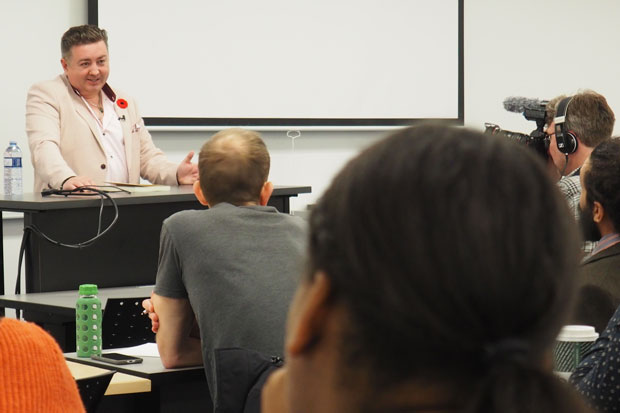Is there a cure for hate? Former neo-fascist shares personal message of hope at Ontario Tech lecture
November 19, 2019

Throughout his teenage and young adult years, Tony McAleer’s life journey was fraught with turbulence, violence and hatred. It was an existence of what McAleer calls personal ‘toxic shame’, anger that descended into deep involvement in anti-immigrant activism and Holocaust denial in the 1980s and then the neo-Nazi group White Aryan Resistance in the 1990s.
For the past two decades, McAleer has turned away from his previous life to champion Life After Hate, a not-for-profit organization he co-founded that’s dedicated to helping people step away from far-right extremism. On November 12, Ontario Tech University’s Centre on Hate, Bias and Extremism invited McAleer to discuss his book The Cure for Hate and his personal journey leaving the white supremacist movement, as well the lessons he has learned countering violence with compassion.
“For 15 years I was taking my radical nature and projecting it on the world, trying to change the world outside of me,” says the British-born and Western Canadian-raised McAleer, now 52. “Fighting between my parents, an absent father, and bullying from my teachers and classmates left me with a sense of no identity and not belonging to anything. Possessing perpetual anger is like drinking poison, but then hoping the other person dies.”
McAleer says he began associating with extremist groups for the sense of camaraderie and support they appeared to provide. He befriended skinheads and embraced the punk music scene, particularly drawn to the false sense of power delivered by the songs’ racist messages and ideologies.
McAleer says his life changed following the birth of his two children and his transition to becoming a single father. His new role drove him away from the dysfunction and destruction of the extremist world he needed to detach from.
“Repairing the damage I’ve caused in my life is on me, not on the people I’ve harmed,” says McAleer. “I finally realized I have more power to change the world outside of me by changing the world inside of me.”
He began speaking publicly about his experiences and his mistakes. Through that process he learned he was not alone in his battle against hate. He discovered a wide network of people around the globe: former gang members, former white supremacists, ex-convicts and troubled youth, all with painful and regretful stories similar to his, all looking to turn their lives around.
During his lecture before a packed room of Faculty of Social Science and Humanities students and faculty members, McAleer encouraged any and all questions, no matter the topic’s sensitivity.
“I do what I do now not for money, but for healing. It’s about healing for the people who suffered because of what I’ve done. I wrote The Cure for Hate not to talk about my time in the movement, but instead to talk about reconciliation and moving forward as a society.”
He says the first step in leaving extremism behind requires finding someone to listen.
“Breaking down the walls I had built around myself required being able to open up about my shame in a safe place, holding up the mirror to myself and preventing old defensive mechanisms from kicking in. Walls come down when you feel like you can be heard.”
About the Centre on Hate, Bias and Extremism
The Centre on Hate, Bias and Extremism assembles researchers at Ontario Tech University as well as other academic and community partners to research and counter hate, bias and extremism in order to promote an equal, inclusive and non-discriminatory society.



